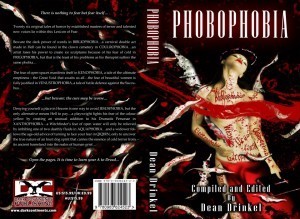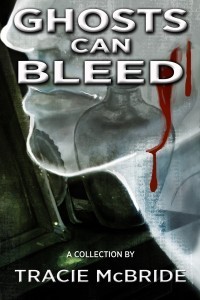What do you fear? Wednesday with Tracie McBride
Today I would like to welcome Tracie McBride on What do you Fear? Wednesday to talk about her story, Hagiophobia, from the Phobophobia anthology released by Dark Continents Publishing.
1. You have cited a number of 'literary crushes' as having inspired you as a writer, such as Stephen King, Robert Heinlein, Margaret Atwood, Anne Rice and Clive Barker. Do you think it is important to have a broad range of influences in order to develop a mature 'voice'?
Absolutely. It's the one piece of advice given to writers that is universally true; for many reasons, one must read widely and voraciously to improve one's craft. I find it increasingly difficult these days to enjoy a story purely for the journey of imagination on which it takes me. Part of my brain is busily analysing and critiquing. I hear that people in other creative industries – movie makers and musicians, for example – have similar experiences. When I find an author whose work allows me to just trust, let go and enjoy it…well, it's like coming home. That's the most important thing I take from my 'crushes' and it's something I strive to achieve in my own work.
2. Your story in the Phobophobia anthology is about Hagiophobia – the fear of holy things. Why do you think there are so many phobias that relate back to fears of the religious and the spiritual?
Some might argue that organised religion is all about the fear; fear of transgression, fear of punishment, fear of burning in an everlasting Hell, or at the very least, fear of not being good enough to enter Heaven. Another interpretation of spirituality and religion is that it is the attempt of human minds to rationalise and come to know that which is essentially unknowable, which leads us right to the biggest fear of all: fear of the unknown.
I'm not a religious person, nor do I believe in Hell, but just the thought that it might exist scares the crap out of me. So I can see how someone who has been steeped in religion since birth, someone who does believe, might find that fear crippling.
3. I was impressed by the stark style of Hagiophobia, it makes the imagery used particularly hard-hitting, was the style a deliberate choice given the subject matter?
Not particularly. I can't claim to have a distinctive style yet, as I'm still learning my craft (and probably will continue to be learning until the day I die), but my work often tends towards a stark, spare style. Strunk and White say to "Omit Needless Words" and I have taken that advice very much to heart.
4. Your story in Phobophobia deals with familial abuse and bullying under the guise of religious obeisance – is this drawn from personal or observed experience?
I come from a secular family in which I am the oldest child; if it were drawn from personal experience, that would make me Clare. So no, it wasn't drawn from my life (or if it was, then I'm not admitting it). They say that your first idea is usually your worst, and the first thing that sprung to mind when I was asked to contribute to an anthology on phobias was the way that phobias usually seem to originate from traumatic events in one's childhood. Familial abuse is usually depicted as being inflicted by a father or father figure, sometimes a mother, occasionally an older brother, but not usually a sister. But I wanted to mess with the tropes a little.
I've drawn elements of the story from a couple of people I know. One friend in particular grew up in the church, moved away from it for a time in early adulthood, then returned to it. During that period of alienation, she did what Felix did at the end of my story, which when she first told me in a detached and matter-of-fact kind of way, made my jaw drop with shock. Her story had a much happier ending, though.
5. What do you fear? Tell me about your own phobias.
Big spiders. Deep water and the things that live in it. Bad things happening to my children. When we first moved to Australia, we went through a summer heat wave in a rented house with no air conditioning, and the temperatures reached 47C. Parts of the state literally spontaneously combusted, and people died, which gave me a mild fear of summer and an obsession with checking temperature gauges and weather forecasts.
6. Clare and Harmony are quite contrasting characters but both ultimately do control Felix in their own way – was this portrayal of a phobia's debilitating effect on an individual's self-control intentional?
Yes, it was, although you're being more charitable to Felix than I am. It's all about the women in Felix's life in this story – his girlfriend, his sister, his largely absent mother who he still feels a need to please, even his boss. Depending on how you look at it, poor Felix either never had a chance to find his own way in the world, or he's never tried.
7. Ambiguity and fatalism is more often seen in short horror fiction than in novel-length works? Why do you think that is? What makes us less willing to accept an 'unhappy' ending when it comes to novels?
We have more time to build up an empathy with the characters in a novel, so we're less inclined to let them go at the end. The short form allows for much more experimentation and dispensing with 'the formula' in general than a novel does, which is why I like it so much. For example, you can write a short story entirely in dialogue if you want, and if you do it well, it will work, but you'd be unlikely to get away with that in a novel-length piece.
Short horror fiction, in particular, thrives on ambiguity and fatalism. I love ambiguity in short fiction because it leaves me room to put my own interpretation on a story. And there's that maxim that the unseen monster is far scarier than the one that is fully revealed, which in a horror story can be used to great effect. That sense of inevitability is also used to great effect in horror fiction – it's like watching a car crash in slow motion, knowing what is about to happen, and being powerless to stop it (only it's a lot safer and saner to watch a metaphorical car crash on paper than an actual car crash in real life – same emotional response, only nobody gets hurt).
8. If the Phobophobia anthology were a series of songs – what genre of music would you say could best express the feelings that inform Hagiophobia?
Because I'm hopelessly mired in the eighties when it comes to music, I'm going to go with post-punk. Think the darker, moodier end of the spectrum, such as The Cure, Joy Division, and…dare I say it, The Church.
9. Tell me about one of the other stories in Phobophobia that you enjoyed and why.
Only one? That's a little tough, isn't it? Oh, alright, then… I don't want to come across as a sycophant, so I can't choose Pteronophobia. In that case, I'll go with K is for Kenophobia by Rakie Keig. I love a story with big themes, like this one that deals with wrongdoing, guilt and forgiveness. It's subtle and atmospheric, and Rakie builds the tension with a deft hand. It has something of the feel of The Sixth Sense about it, and not just because the protagonist sees dead people – that feel probably lies in The Big Reveal, which is shocking and totally unexpected, yet somehow when you look back over the story again, you can see the signs that were there all along.
10. So what does 2012 hold for Tracie McBride? Any last words?
I've promised myself that 2012 will be my Year of Change, and now that I've written it down here for others to witness, I'll have to stick with it. I have a second collection of short stories in progress, a follow up to my debut collection Ghosts Can Bleed released by Dark Continents Publishing in 2011. The new collection will be all previously unpublished originals and will represent my first foray into independent publishing. My other work-in-progress is my debut novel – and when I say "in progress", I mean it's currently gestating in my brain. All I'm willing to say about it at this stage is that it is about 21st century mermaids. Oh, and sex and blood and death.
Thank you, Tracie!
Phobophobia is available at the following links:
Ghosts Can Bleed is available for purchase at the following links:
If you want to find out more about Tracie, please visit the following linsk
Tweet






